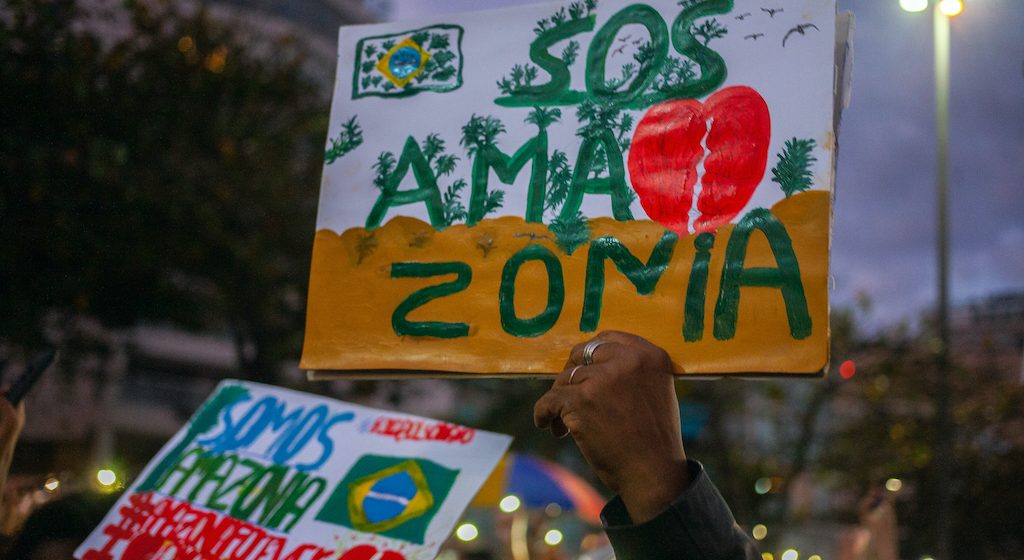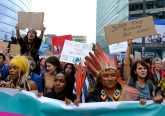Lula signalled new winds for Brazilian climate politics in his victory speech after winning the presidential election. In his words: “Brazil is ready to retake its leadership in the fight against the climate crisis, by protecting all its biomass, especially the Amazon rainforest”.
During Lula’s first presidential mandate at the beginning of the 2000s, Brazil, and other countries led by progressive leaders across Latin America, expanded mega extractive projects to fund their distributive politics. These projects are responsible for environmental degradation and threats to local people’s health and lives until this day. However, Lula also has also great achievements. Between 2005 and 2012, Brazil registered the lowest illegal deforestation in the Amazon as a result of the implementation of the Action Plan for the Prevention and Control of Deforestation in the Legal Amazon (PPCDAm) designed by former Environmental Minister Marina Silva.
The recently published United Nations Framework Convention on Climate Change report states that countries’ pledge to kerb GHG emissions is not enough to contain global warming. In Brazil, change in land use, mainly in the form of deforestation, represents 44% of the national GHG. During the Bolsonaro administration, between 2020 and 2021, the Amazon registered high records for deforestation, reaching 13.038 km2 and Brazilian GHG emissions have been at their highest in the last 19 years. This is a result of the defunding and dismantling of federal agencies such as the Brazilian Institute of the Environment and Renewable Natural Resources (IBAMA) and The Chico Mendes Institute for Biodiversity Conservation (ICMBIO). Furthermore, the PPCDAm was interrupted by Bolsonaro’s environment minister Ricardo Salles, along with the demoralisation of The National Institute for Space Research and the suspension of the Amazon Fund. More importantly, Bolsonaro and his allies have opposed the demarcation of indigenous territorial rights misusing the Brazilian constitution and supported illegal gold mining in indigenous land and conservation units. These are some of the damages Lula will need to address to achieve his promise of Zero Deforestation and to fight against illegal activities which have gained enormous straight all across the Amazon in the past years.
The political challenges Lula will face once in power: the agribusiness industry and Congress
Once in office, Lula will face pressures from the agribusiness industry and Congress. The arc of deforestation that materialised the advancement of the agribusiness frontier in the Amazon starts in the west of Maranhão, passing by the South Para all the way to Mato Grosso, Rondônia and Acre. Not only carbon released from deforestation is a threat in these regions, but so is methane emission from cattle ranching, which positions Brazil among the countries that have the greatest methane emissions in the world. Across these territories, Bolsonaro won the majority of the votes. He was successful in eight of the ten municipalities with the highest deforestation rates. Some have suggested that the support Bolsonaro received from ruralists during his mandate illustrates a shift in the political power and the cartography of elites in Brazil, with a strong lobby power at the Parliament and new commercial partnerships leaning toward the Middle East and Asia. Thus, agribusiness is a political, and a cultural force that can no longer be dismissed.
Over the years, the agribusiness industry has developed a discourse that claims to feed Brazilians and serves as a solution to Brazil’s hunger problem. This has been a reoccurring theme and could become a political constraint for Lula. If it is true that 33 million people in Brazil experience hunger, it is also true that 70% of the food that feeds Brazilians comes from small farmers. The majority of soy production in Brazil is exported which explains the rise in food prices across the country. This suggests that supporting small agriculture is not only a social, but a climate policy. However, interfering in current patterns of agribusiness production in Brazil will take work, especially as it also affects Brazil’s foreign relations with China. China is the first market of Brazilian soy and iron ore, and as former partner of the five emerging economies: Brazil, Russia, India, China, and South Africa (BRICS), it is a critical element for Lula governance.
The dichotomies Lula will face regarding agribusiness and climate politics are also materialised in debates about the European Union’s imported deforestation legislation prohibiting Brazilian products coming from illegal deforested land. On the one hand, this has disturbed a portion of corporate leaders in Brazil. On the other hand, important agribusiness leaders, like Katia Abreu, previous minister of agriculture during the second Dilma Roussef mandate (2015-2016), came out in social media to convince her peers of the necessity to mingle environmental protection with agribusiness production to make sure their business continues as usual. Simone Tebet, which was key in Lula’s election, perfectly embodies this movement. However, the continuing business as usual of soy and corn monoculture and cattle ranching without environmental legislation and agrarian regulation would mean carrying on illegal land grabbing, which is a threat to climate politics, biodiversity, and the Amazon.
It will be especially hard to overcome these issues as it is likely that elected officials in Congress and the Senate will vote against the re-implementation of environmental law regulation, protection, and territorial rights. For instance, during Bolsonaro’s presidency, 37% of Congressmembers and Senators voted against an environmental agenda. This number has increased to 42,6% during this past election. Also, the voting of what has been called in Brazil the “destruction package” (pacote da destruição), which include draughts of law regarding indigenous and traditional communities’ territorial rights, environmental allowances, illegal mining, use of pesticide, among others, will be crucial if Lula wants to stop environmental destruction and ostensive politics against local communal rights and agrarian regulation.
The new project for the standing forest
Scientists have warned that the Amazon is close to reaching its tipping point. If 20% to 25% of native land is deforested in Brazil, the Amazon will not be able to recover, and it will become a big savanna field. More specifically, the Brazilian Amazon rainforest will stop being a climate change mitigation tool and will become a climate change accelerator force. Many international leaders who salute Lula for his victory welcomed Brazil back into the international political arena and consider him a vital partner in the ongoing fight to kerb global GHG emissions.
During COP 27 as President-elect, Lula shared his plans to end illegal deforestation by 2030. Furthermore, Lula announced the creation of a federal body exclusively designed to address the climate crisis and the creation of the Ministry of Indigenous Peoples. During the COP Brazil also created an alliance with Indonesia and the Democratic Republic of Congo – countries that host 51% of the remaining tropical forest in the world. The purpose of this alliance is to release finances for the standing forest economy, including carbon markets and bioeconomy. In this scenario, in Brazil and elsewhere, natural capital is becoming a prominent source of investment from financial capital with major influence in determining credits, taxes and new standards to the re-gender of economy. The economic agenda for the Amazon is based on sustainable values chains of forestry commodities and carbon credits is being promoted by Amazon governs within the Interstate Consortium of Governors and Lula himself, who during one of the presidential debates said: “I will make of the Amazon biodiversity a source of wealth”. Scalability here seems to deserve attention: does Amazon biological and social specificities supports global value chains style of production? For sure reforestation, followed by forestry management, could be a source of new greens jobs for the region. However, it is yet to be seen how this new economic project for the standing forest will play out with the currently expensive nature of an extractive industry that is all over the forest.
As Lula was elected to power with a coalition that has different policy positions on environmental and social rights, it is unclear clear if the political change needed to give a response to climate crisis in Brazil will come from inside the state. Lula might end up, once in power, needing to maintain a viable state that demands the same old politics based on the extraction of non-renewable natural resources. Although this election is a victory that deserves to be celebrated, this does not mean Lula will have enough force in a fragmented country to shape a new state that does not rely on the exhaustion of land and people. Without the Amazon, we can no longer dream of a virtuous future for the next generations. But the Amazon, and especially Amazonians, should not bear on their shoulder the responsibility to make sure surviving is a possibility for all of us.





